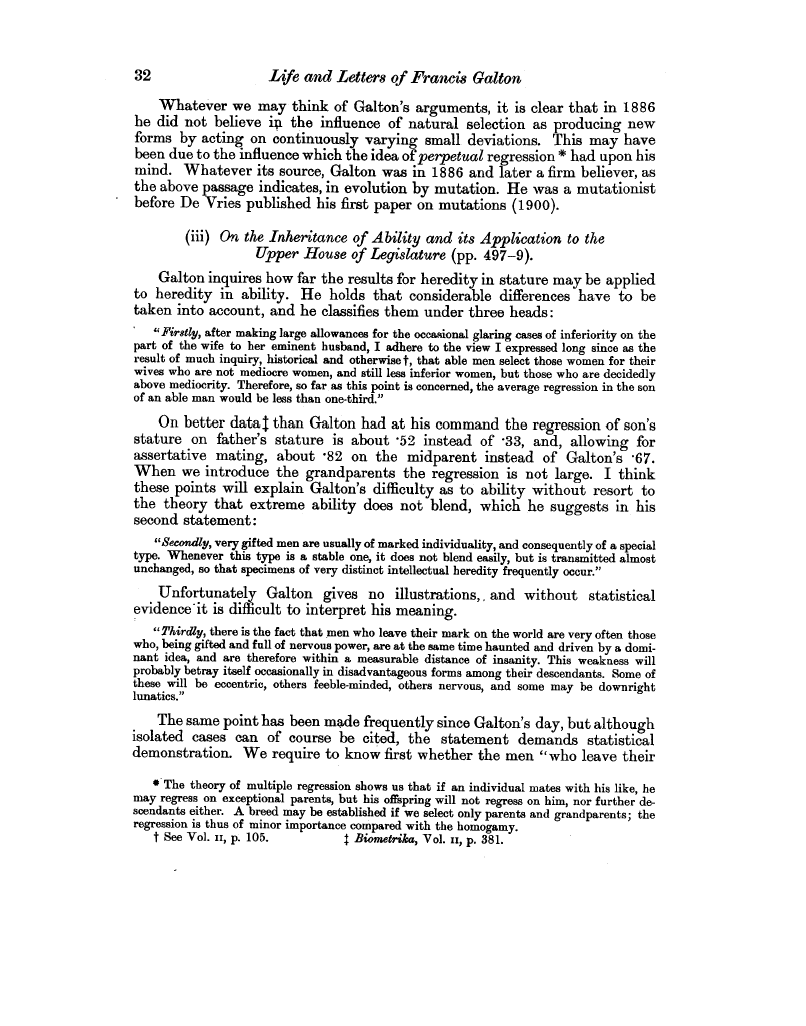| ||||||

OCR Rendition - approximate
32 Life and Letters of Francis Galton Whatever we may think of Galton's arguments, it is clear that in 1886 he did not believe iu the influence of natural selection as producing new forms by acting on continuously varying small deviations. This may have been due to the influence which the idea of perpetual regression * had upon his mind. Whatever its source, Galton was in 1886 and later a firm believer, as the above passage indicates, in evolution by mutation. He was a mutationist before De Vries published his first paper on mutations (1900). (iii) On the Inheritance of Ability and its Application to the
Galton inquires how far the results for heredity in stature may be applied to heredity in ability. He holds that considerable differences have to be taken into account, and he classifies them under three heads "Firstly, after making large allowances for the occasional glaring cases of inferiority on the part of the wife to her eminent husband, I adhere to the view I expressed long since as the result of much inquiry, historical and otherwise t, that able men select those women for their wives who are not mediocre women, and still less inferior women, but those who are decidedly above mediocrity. Therefore, so far as this point is concerned, the average regression in the son of an able man would be less than one-third." On better data I than Galton had at his command the regression of son's stature on father's stature is about •52 instead of -33, and, allowing for assertative mating, about •82 on the midparent instead of Galton's •67. When we introduce the grandparents the regression is not large. I think these points will explain Galton's difficulty as to ability without resort to the theory that extreme ability does not blend, which he suggests in his second statement "Secondly, very gifted men are usually of marked individuality, and consequently of a special type. Whenever this type is a stable one, it does not blend easily, but is transmitted almost unchanged, so that specimens of very distinct intellectual heredity frequently occur." Unfortunately Galton gives no illustrations,, and without statistical evidence-it is difficult to interpret his meaning. "Thirdly, there is the fact that men who leave their mark on the world are very often those who, being gifted and full of nervous power, are at the same time haunted and driven by a dominant idea, and are therefore within a measurable distance of insanity. This weakness will probably betray itself occasionally in disadvantageous forms among their descendants. Some of these will be eccentric, others feeble-minded, others nervous, and some may be downright lunatics." The same point has been made frequently since Galton's day, but although isolated cases can of course be cited, the statement demands statistical demonstration. We require to know first whether the men "who leave their * The theory of multiple regression shows us that if an individual mates with his like, he may regress on exceptional parents, but his offspring will not regress on him, nor further descendants either. A breed may be established if we select only parents and grandparents; the regression is thus of minor importance compared with the homogamy. t See Vol. ii, p. 105. $ Biometrika, Vol. ii, p. 381.
|